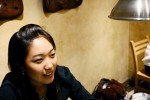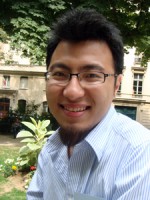Title
Subhead
The final New Juilliard Ensemble concert of this school year features world premieres of pieces by current composition students Sun-Young Park and Wei-Chieh Lin, who, after an audition, were invited to write for this season. (A third commission, by recent grad Conrad Winslow, premiered in November.) Park, a first year master’s student from Korea, composed Legend as part of her ongoing efforts to combine Western compositional techniques with what she calls the Eastern (primarily Korean) sound. An experienced choral composer, Park imparts a striking lyricism to her music. Lin, a C.V. Starr Doctoral Fellow originally from Taiwan, is completing his doctorate this semester; his The Re-Emergence of Time is therefore a kind of farewell to Juilliard. Lin has the distinction of being the only composer selected twice to write for N.J.E.; the first piece was premiered in 2004. (Four years must elapse before an audition winner can submit again.)
Body
It is always interesting to see what composers provide as program notes. Park’s is a nice, straightforward explanation of the Asian elements in her piece and its underlying aesthetic. Lin, by contrast, submitted a statement whose intricacy, I felt, risked alienating the many non-musicians who regularly attend N.J.E. concerts. After admitting that his brain was still immersed in the highly analytic doctoral document that he was completing, he provided the following revision, which helps the listener to thread through this new musical experience: “The title The Re-Emergence of Time suggests an underlying temporal mechanism that emerges and unfolds through multiple stages of clarity and concealment. The term ‘emergence’ also refers to the outgrowth of relationships and the progression from fairly simple materials to form intricate and complex multilayering patterns of organization.”
This program was also originally to have a premiere by a faculty member, but life has a way of interfering with the best plans, and it was not completed in time. I bring up the subject here not to embarrass the composer but because his many fans—including students who wanted to play in his piece—may wonder what happened. Manuel Sosa, a member of the Pre-College faculty, had proposed a fascinating concept, a chamber orchestra piece with typewriter solo. In a “novelty” such as Morton Gould’s Concerto for Tap Dancer and Orchestra, such an integration would be fairly easy. Sosa, however, does not write novelties; his music is extremely intense, and the combination of the rhythmic typewriter with the freely lyric environment has proven elusive. So he has asked for more time, which I am happy to give him, knowing that late will be vastly better than never.
A cancellation in midseason can cause a scramble to find the right substitute. Fortunately, many publishers send me scores as soon as they are printed. As it happened, only two days before Sosa informed me that he would not be ready, I received a new score by the distinguished Polish composer Zygmunt Krauze, whose music I admire tremendously. As fate would have it, his Canzona (2011) was exactly the right length and fit the program perfectly, and I snapped up this chance to give its first performance outside Europe.
Two other works on this program will also receive their first performances on this side of the world. One is by Toshi Ichiyanagi (’58,composition), a student of John Cage who was for many years a leader of the Japanese avant-garde. Coincidentally, in Between Time and Space, Ichiyanagi has also has explored the nature of time in music, though very differently than Wei-Chieh Lin does in his piece. The other Western Hemisphere premiere is Dutch composer Robert Nasveld’s song cycle to six poems by the Greek master C.P. Cavafy. Despite the fact that Nasveld’s first language is Nederlands (the Dutch name for their native language), he has produced a flawless setting of the English translation. The soloist is baritone Tobias Greenhalgh, a first-year master’s student. The N.J.E. audience may remember Greenhalgh’s hilarious performance in Juice Box Hero, a mini-opera about a first-grade class play by Chris Kapica (B.M. ’08, M.M. ’09,composition) that N.J.E. premiered two years ago.
Nasveld will be present for the last rehearsals and also will address one of my seminars, speaking especially about the current terrible classical-music funding crisis in the Netherlands.







